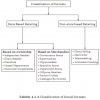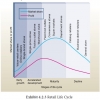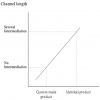MARKETING MANAGEMENT - Retailers And Wholesalers
Functions Of Retailing - Retailers And Wholesalers
Posted On :
Retailers perform four major activities in the value chain. They are:
Functions Of Retailing
Retailers perform four major activities in the value chain. They are:
1. Arranging assortment
2. Breaking bulk
Retailers perform four major activities in the value chain. They are:
1. Arranging assortment
2. Breaking bulk
3. Holding
stock and,
4. Providing service
Each of these activities holds significance when the product gets transferred from the manufacturer or the wholesaler to the retailer. We will discuss about each of the activities in detail and their contribution in the value addition to the offering.
4. Providing service
Each of these activities holds significance when the product gets transferred from the manufacturer or the wholesaler to the retailer. We will discuss about each of the activities in detail and their contribution in the value addition to the offering.
• Arranging Assortment
An
assortment is a retailer’s selection of merchandise
and this includes the length and breadth of the products. The assortment may
include substitutable items of the same brands with different price points.
Making decisions on the assortments is one of the crucial elements for a
retailer; a small retailer makes decisions based on the perceptions he holds
for a particular product and by past experiences.
Those in the organized sector rely on future projections, past sales record and on detailed study on various factors that may affect the sales. Retailers need to consider other factors such as the store layout, the ambience, and merchandise mix to create an urge. Subhiksha one of the leading grocery and pharmaceutical chain in Tamil Nadu has an impressive assortment of only the fast moving brands and stock keeping units (SKU’s) rather than all that is available, while Food World positions itself as a one stop shop as a result of which it holds multiple brands. Subhiksha works on its layout, price (value for money) as it’s tool in reaching the consumer groups
In the News
Subiksha, the pharma and FMCG products retail chain in Chennai, uses price discounting as a major unique selling proposition. Subiksha offers a 10 per cent discount on the ‘maximum retail price’ of all products it sells. Foodworld and Vitan, both South-based, have also started offering sales promos and discounts on select products’ MRPs
Source: www.etretailbiz.com
Those in the organized sector rely on future projections, past sales record and on detailed study on various factors that may affect the sales. Retailers need to consider other factors such as the store layout, the ambience, and merchandise mix to create an urge. Subhiksha one of the leading grocery and pharmaceutical chain in Tamil Nadu has an impressive assortment of only the fast moving brands and stock keeping units (SKU’s) rather than all that is available, while Food World positions itself as a one stop shop as a result of which it holds multiple brands. Subhiksha works on its layout, price (value for money) as it’s tool in reaching the consumer groups
In the News
Subiksha, the pharma and FMCG products retail chain in Chennai, uses price discounting as a major unique selling proposition. Subiksha offers a 10 per cent discount on the ‘maximum retail price’ of all products it sells. Foodworld and Vitan, both South-based, have also started offering sales promos and discounts on select products’ MRPs
Source: www.etretailbiz.com
• Breaking Bulk
Another activity that retailers
perform is breaking bulk. Breaking bulk means physical repacking of the
products by the retailers in small unit sizes according to the customer’s
requirement and convenience. The retailers procure goods from the wholesalers
in large quantities in order to reduce transportation costs and time. They
further break the products or arrange them into convenient units. The entire
operation not only adds value to the end user but also send a positive word of
mouth about the manufacturer or the supplier. This particular function is
losing its prominence due to the advent of the different categories like the
ready to wear segment.
In the News
With big brands from textile companies growing weary in adapting to the fast-paced changing scenario in the ready-to-wear industry, it’s the small brands, including private labels that are completely transforming the way men, women and children dress. A whole bunch of players have plunged into this branded ready-to-wear business. According to current KSA Technopak reports, the branded ready-to-wear segment contributes 21% to the apparel sector. And the present total market size of the ready-to-wear segment is pegged at around Rs 40,000 - 45,000 crore
The third activity retailers perform is holding stock. Retailers maintain appropriate levels of inventory. In the current scenario holding stock has got its own positives and negatives. Retailers have to face a negative consequence for holding unwanted stocks while at the same time keeping low stocks may affect the business. Based on the size of the retailer inventory decisions are worked. A large retailer uses specialized software’s for maintaining inventory levels while small retailers use day to day transactions as a yardstick in maintaining the inventory
The service the retailer’s offer is more than just the core product. It may be an add-on to the core product itself. The add-ons may be the credit facility they may provide, after sales service or even providing information about the latest products to the customers. For the suppliers the retailers may provide with information pertaining to the trends in the market, information about a particular target group and even provide storing facility.
Time zone, a part of the Titan group were the one of the pioneers in organized sector to some up with specialized people who were trained in handling any complexities in the instrument.
Activity
Visit a near by Kirana store and a departmental store, try to find out what different activities the retailers provide for the customers and the suppliers. Discuss your findings in a group.
In the News
With big brands from textile companies growing weary in adapting to the fast-paced changing scenario in the ready-to-wear industry, it’s the small brands, including private labels that are completely transforming the way men, women and children dress. A whole bunch of players have plunged into this branded ready-to-wear business. According to current KSA Technopak reports, the branded ready-to-wear segment contributes 21% to the apparel sector. And the present total market size of the ready-to-wear segment is pegged at around Rs 40,000 - 45,000 crore
• Holding Stock
The third activity retailers perform is holding stock. Retailers maintain appropriate levels of inventory. In the current scenario holding stock has got its own positives and negatives. Retailers have to face a negative consequence for holding unwanted stocks while at the same time keeping low stocks may affect the business. Based on the size of the retailer inventory decisions are worked. A large retailer uses specialized software’s for maintaining inventory levels while small retailers use day to day transactions as a yardstick in maintaining the inventory
• Extending Service
The service the retailer’s offer is more than just the core product. It may be an add-on to the core product itself. The add-ons may be the credit facility they may provide, after sales service or even providing information about the latest products to the customers. For the suppliers the retailers may provide with information pertaining to the trends in the market, information about a particular target group and even provide storing facility.
Time zone, a part of the Titan group were the one of the pioneers in organized sector to some up with specialized people who were trained in handling any complexities in the instrument.
Activity
Visit a near by Kirana store and a departmental store, try to find out what different activities the retailers provide for the customers and the suppliers. Discuss your findings in a group.
Tags : MARKETING MANAGEMENT - Retailers And Wholesalers
Last 30 days 1190 views















